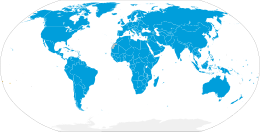Commons:Copyright rules by territory/United Nations/ca
|
Normes de dret d’autor: United Nations Drecera: COM:UNITED NATIONS | |
 | |
 | |
| Durades | |
|---|---|
| Altres | |
| Common licence tags |
{{PD-US-no notice-UN}} {{PD-UN-doc}} |
| Tractats | |
| Conv. Univ. sobre Dret d’Autor | 24 July 1971 |
This page provides an overview of copyright rules of the United Nations relevant to uploading works into Wikimedia Commons. Note that any work originating from the United Nations must be in the public domain, or available under a free license, in the United Nations and in the United States before it can be uploaded to Wikimedia Commons. If there is any doubt about the copyright status of a work, refer to the relevant laws for clarification.
General rules
According to shop.un.org as of 2019,
- Permission is required to reuse content from any and all United Nations’ online platforms and databases (namely, legal and statistical databases).
- With regard to treaties and conventions, while each individual text is in the public domain, the online UN Treaty Collection is proprietary.
- Use and display of the United Nations emblem is highly restricted and essentially limited to the organization’s activities. You may not use any trademark, official mark, official emblem, flag or logo of the United Nations, or any of its other means of promotion or publicity, to represent or imply an association or affiliation with the United Nations without the United Nation’s prior written consent.
- UN photos cannot be altered, sold, redistributed or used to create derivative works.
Rules for certain types of documents
The United Nations' basic policy towards copyrighting as set forth in administrative instruction ST/AI/189/Add.9/Rev.1 of 26 March 1985 was not to seek copyright with the intention of thus facilitating dissemination as widely as possible of the ideas in United Nations publications. Under ST/AI/189/Add.9/Rev.2 of 17 September 1987, the United Nations would still not seek copyright for official records, documents and public information material, but did seek protection for all recurrent publications, studies or reports.
United States status
Under the Second Protocol of the Universal Copyright Convention (Paris text), protection under U.S. copyright law is expressly required for works published by the United Nations, by UN specialized agencies and by the Organization of American States.[17 USC Sec. 104 (b.5)]
Senyals de drets d'autor
Vegeu també: Commons:Senyals de drets d'autor
- {{PD-US-no notice-UN}}: Work is excerpted from an official document of the United Nations published in the United States prior to 17 September 1987.
- {{PD-UN-doc}}: documents oficials de les Nacions Unides. Published by the United Nations without a copyright notice, was left in the public domain in order to disseminate "as widely as possible the ideas (contained) in the United Nations Publications". It falls into one of the following categories outlined in Administrative Instruction ST/AI/189/Add.9/Rev.2 (paragraph 2):
- Official records (proceedings of conferences, verbatim and summary records, periodic supplements, compilations of resolutions, etc.)
- United Nations documents issued with a UN document symbol
- Public information material designed primarily to inform the public about United Nations activities (not including material that is offered for sale)
- {{PD-UN-map}} – mapes de les Nacions Unides.
See also
Citations
- ↑ Rights & Permissions. United Nations (2018). Retrieved on 2018-12-29.
- ↑ ST/AI/189/Add.9/Rev.2. United Nations (17 September 1987). Retrieved on 2018-12-29.
- ↑ House Report No. 94-1476 in connection with Title 17, United States Code, Section 104 (2006-08-31).